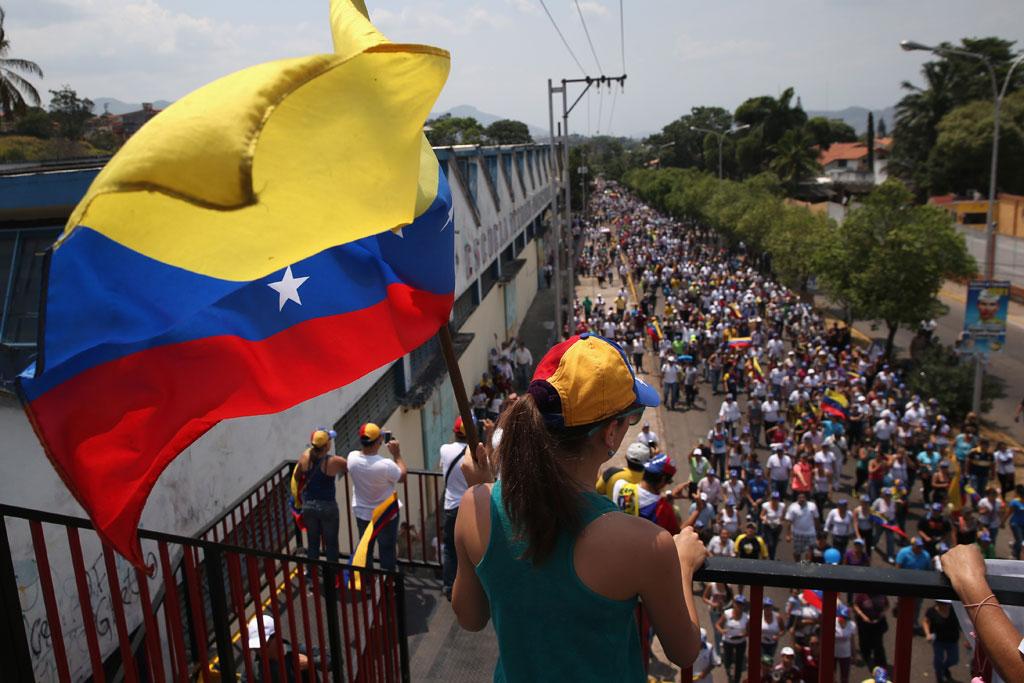Foreign and domestic media face restrictions amid Venezuela unrest
Anti-government protesters march through the streets on March 8, 2014 in San Cristobal, Venezuela.
The Venezuelan government has denied visas to Brazil's Globo TV show producers in retaliation for the channel's coverage of anti-government protests, reported Brazilian newspaper Folha de S. Paulo.
The unrest, which has claimed 39 lives, has brought questions about Venezuela's press freedom to the forefront.
In addition to violent crime, inflation and shortages of basic goods, free speech is one of the critical issues fueling the opposition's ire toward the government, noted GlobalPost senior correspondent Simeon Tegel.
Venezuelan President Nicolas Maduro warned, "the 'bourgeois media' would be subjected to 'very strict' new controls to stop their 'propaganda,'" Tegel wrote.
"The purchase last year of Globovision by a pro-Maduro group of businessmen, and the resulting exodus of the network's journalists, means there is now not a single national TV station critical of the government," he wrote.
At the height of the protests in early February, Venezuela's telecommunications commission blocked Colombia's NTN24 television channel for airing footage of the protests.
Also in February, Maduro's government revoked press credentials of CNN journalists and threatened to expel them. Officials handed the credentials to the journalists a day later, CNN reported.
There were also reports of journalists being harassed and detained while covering the demonstrations. The Committee to Protect Journalists, a nonprofit press freedom organization, condemned the violence against journalists covering the protests.
The group's deputy director Robert Mahoney called on both government security forces and the opposition to "respect the right of the press to report on the protests in the country," adding that it's "crucial" for authorities to ensure the safety of journalists.
Safety of journalists and residents continues to be a challenge in Venezuela.
This past weekend, armed men reportedly kidnapped a Venezuelan broadcast journalist in Caracas. Her father appealed to her abductors to "see sense" and release Nairobi Pinto, who works as an assignment editor for Globovision news network, the BBC reported.
Journalists in Venezuela are demanding the release of Pinto. They are posting photos on Twitter using the #LiberenANairobi hashtag:
Although the motive for the kidnapping isn't known, abductions aren't a rare occurrence in the South American country.
In fact, crime rates are one of the points of contention between the government and opposition contributing to the unrest, as noted by the Caracas Chronicles.
Venezuelan Interior Minister Miguel Rodriguez Torres told Reuters that the homicide rate was 39 per 100,000 inhabitants in 2013. He added kidnappings had decreased by 51 percent in the same year, but didn't give any details about that figure.
Independent researchers contest those claims. The nonprofit Venezuelan Violence Observatory tallied 24,763 violent deaths in the country in 2013. In 2010, the United Nations Office on Drugs and Crime reported that 13,080 people were killed as a result of intentional homicide.
The true numbers are unknown.
The story you just read is accessible and free to all because thousands of listeners and readers contribute to our nonprofit newsroom. We go deep to bring you the human-centered international reporting that you know you can trust. To do this work and to do it well, we rely on the support of our listeners. If you appreciated our coverage this year, if there was a story that made you pause or a song that moved you, would you consider making a gift to sustain our work through 2024 and beyond?
